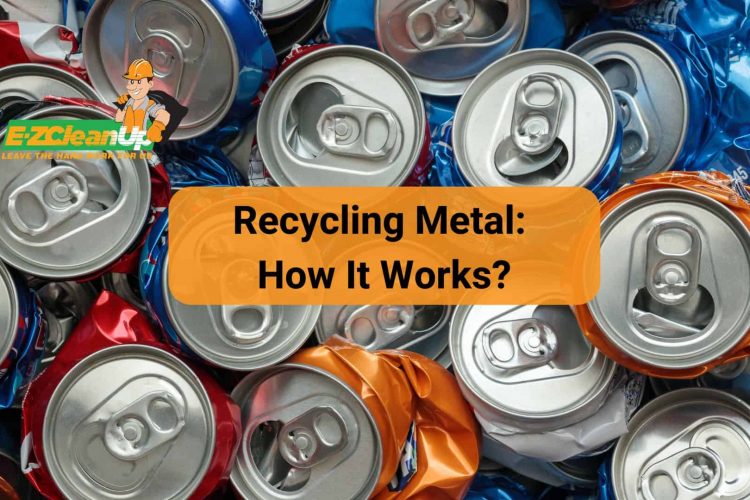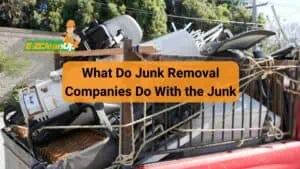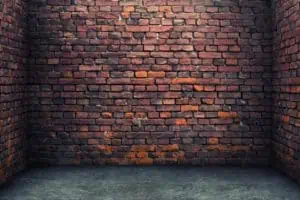Scrap metal is collected from various sources and sorted into ferrous and non-ferrous categories. It is cleaned, shredded, melted, and purified using advanced technologies. The recycled metal is then formed into new products, supporting a circular economy and reducing environmental impact.
If you want to find out more about how recycling metal works and what it is for, read our article below.
Collection of Scrap Metal
Scrap metal is everywhere—from our homes and workplaces to big industries. At home, you might find metal in food cans and old appliances. Businesses and factories have even more, like parts from cars and materials left over from building things.
Collecting this metal is the first step in recycling, turning what we might throw away into something new again.
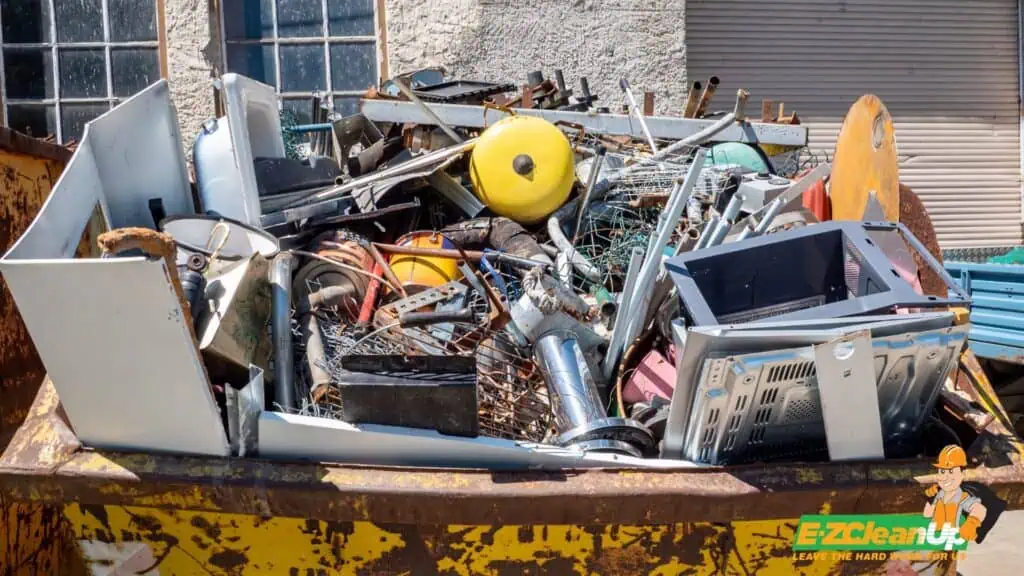
How It’s Collected
The collection of scrap metal varies by method and location. But common approaches include curbside recycling programs, drop-off centers, and direct selling to scrap yards.
Municipal services frequently facilitate curbside recycling. They do this by giving residents designated bins for metal waste. This makes it simpler to segregate from other types of waste.
Drop-off centers serve as a central collection point for larger items and quantities that are not suitable for curbside pickup. Meanwhile, scrap yards actively buy and sell scrap metal. They provide a market for recycled metals.
Why Sorting Matters
Initial sorting is an important step in the recycling process. It focuses on separating ferrous metals, which contain iron and are magnetic, from non-ferrous metals, such as aluminum and copper, which are not.
This separation is crucial because it determines the recycling approach and the potential quality of the recycled metal. Magnets are commonly used to distinguish ferrous metals, while other properties like color and weight help identify and sort non-ferrous metals.
Efficient sorting enhances the value of the scrap metal. It reduces processing costs and time during the recycling phase.
Sorting and Processing at Recycling Facilities
In modern recycling facilities, advanced sorting techniques are important. Magnets are widely used to separate ferrous metals from non-ferrous components. This process simplifies recycling operations and enhances the purity of the recycled materials.
Infrared sensors and X-ray technologies are increasingly incorporated to handle the sorting of non-metallic items and more complex waste streams. These sensors can identify materials based on their chemical composition.
This is particularly crucial in e-scrap recycling, where different materials need to be accurately sorted to recover valuable metals like copper and aluminum.
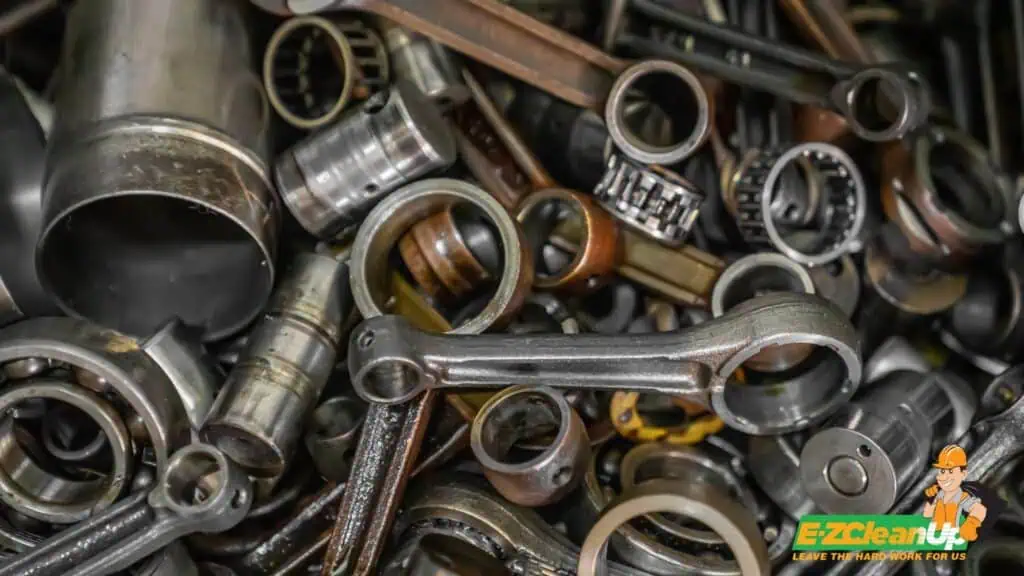
Cleaning the Metal: Removing Impurities
The cleaning process involves removing non-metal components and contaminants from the collected metals. This step is crucial to ensuring the quality of the recycled output.
Technologies like shredding and pre-shredding are employed to break down large pieces of waste into smaller, manageable sizes. This makes the extraction of valuable materials more efficient. This maximizes the recovery of useful materials while minimizing the environmental impact of the recycling process.
Processing the Metal: Compacting and Shredding
By compacting, the volume of scrap metal is significantly reduced. This optimizes transportation and storage. Shredding helps further reduce the size of the metal pieces.
This is crucial for the melting process, as smaller pieces have a larger surface area-to-volume ratio. The process facilitates quicker and more energy-efficient melting.
Melting and Purification
Melting scrap metal is a core process in recycling, with specific furnaces designed for different metals to optimize efficiency and quality. Each type of metal, such as steel, copper, or aluminum, requires a different furnace setup due to varying melting points.
This specialization ensures that the metal is melted efficiently without contamination, which is crucial for maintaining the integrity of the recycled material.
Energy Efficiency
The melting of recycled metals consumes significantly less energy compared to producing metals from raw materials. This energy efficiency makes recycling economically viable and favorable to the environment.
By using recycled materials, the process conserves energy and reduces greenhouse gas emissions. This aligns with sustainable practices that benefit the industry and the environment.
Purification Methods
After melting, purification is critical to remove impurities that can affect the metal’s quality and functionality. Common methods include electrolysis. This is the process where an electric current is used to refine the metal.
It separates valuable material from impurities such as sulfur, phosphorus, or other contaminants. This step is vital for achieving high-purity metal that meets industry standards for subsequent manufacturing uses.
Forming New Products
The process of cooling and solidifying recycled metal is a critical stage in the recycling process. After metals are melted and purified, they are transported to a cooling chamber. This is where they solidify into various forms, such as bars, sheets, or blocks.
The specific shape depends on the intended use of the metal. This stage is essential as it prepares the metal for subsequent manufacturing processes. It ensures that it retains high quality and meets industrial standards.
Examples of Products
Recycled metals are transformed into a wide range of products. This highlights the versatility and sustainability of metal recycling. Common products include aluminum cans, widely used in the beverage industry, and steel and aluminum parts used in the automotive industry.
Other applications include construction materials, where metals like steel are used for structural components, and electronics, where various metals are essential for manufacturing components.
The Cycle of Metal Recycling
The recycling of metal forms a circular economy, continually moving from collection and processing to being manufactured into new products and eventually recycled again. This cycle reduces waste and conserves natural resources by minimizing the need for new raw materials.
It also contributes significantly to environmental sustainability by lowering energy consumption and reducing greenhouse gas emissions associated with metal production from virgin materials.
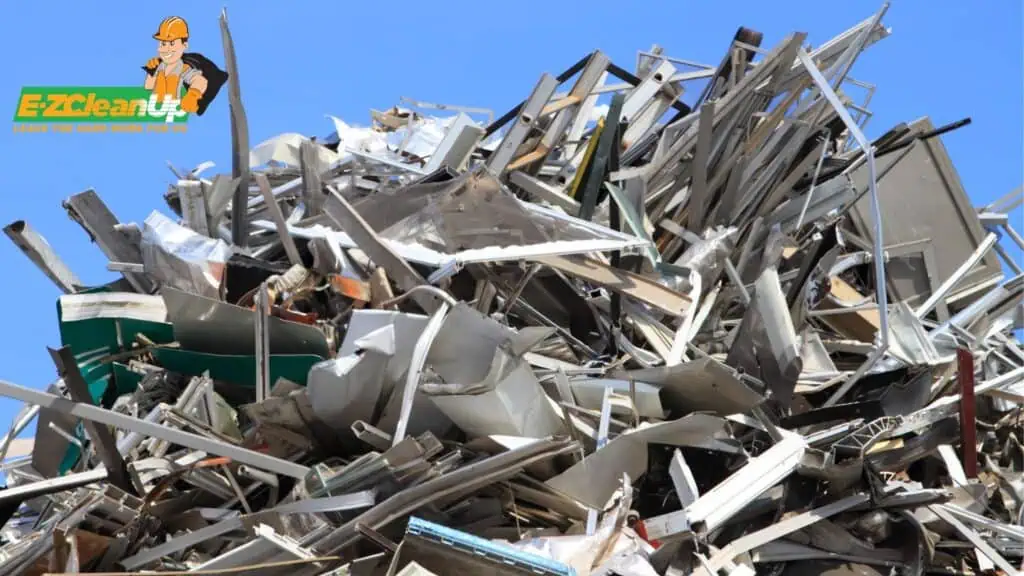
Economic and Environmental Benefits
Recycling metal significantly lowers manufacturing costs by reducing the need for virgin raw materials, which are often more expensive and energy-intensive to process. By using recycled metals, manufacturers save on energy costs and materials.
This enhances overall cost-effectiveness. This process also stabilizes metal prices by decreasing the reliance on volatile raw material markets.
Environmental Impact
Metal recycling plays a crucial role in environmental conservation by significantly reducing the need for landfill space. Metals in landfills can lead to environmental contamination; recycling them helps prevent this.
Moreover, recycling metals reduces the extraction of new raw materials. This conserves limited natural resources while minimizing the ecological damage from mining operations.
Supporting Sustainability
The recycling of metals is integral to the development of a circular economy, where materials are reused and continuously cycled through the economy rather than being discarded. This process reduces waste and environmental impact.
It also supports sustainable growth by ensuring that metal resources remain in use for as long as possible. As a result, it reduces the overall environmental footprint.

Efficient Recycling Starts Here
The recycling metal process saves energy and reduces waste by repurposing ferrous and non-ferrous metals. For those looking to clear out metal clutter, EZ CleanUp provides professional removal services that make recycling easier.
We handle everything from pick-up to proper disposal. We ensure compliance with recycling standards. Call us to learn more.

